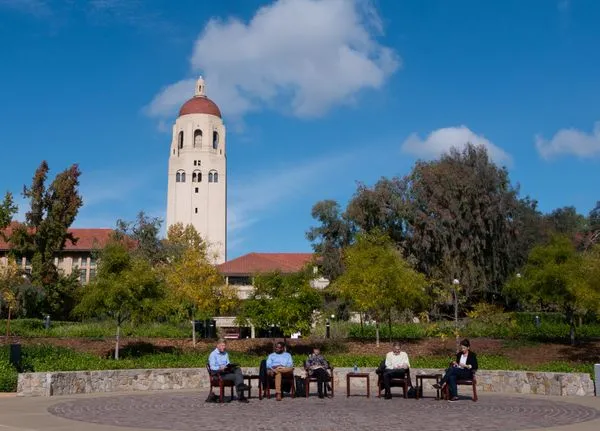Democracy is slowly eroding in politics and news due to the polarization of online media, and the misuse of and lack of access to technology, Stanford professors warned during Tuesday’s Democracy Day event at Meyer Green.
The event was part of Stanford’s inaugural Democracy Day, which featured an itinerary of faculty panels and community activities at the intersection of civic engagement, academic integrity and digital technology. Democracy Day coincides with the U.S. Election Day and was created by the University in June to highlight democratic participation and civic engagement within the Stanford community.
Tuesday’s conversation, entitled “Is Democracy in Danger?,” was moderated by Freeman Spogli Institute for International Studies director Michael McFaul. The event featured panelists across a variety of fields, including political science assistant professor Hakeem Jefferson, computer science professor Mehran Sahami ’92 M.S. ’93 Ph.D. ’99, communication lecturer Janine Zacharia and Lorry I. Lokey Visiting Professor in Professional Journalism Cheryl Philips.
According to Sahami, people currently live in information bubbles curated for them by online media, and technology creates alternate facts that polarize the world. He mentioned a social network simulation that he showed to students in class that consisted of slightly right-leaning and left-leaning users. If the click-through rate of news articles is low, people just share content and the network stays connected. But when the network attempts to maximize clicking rate — as is the case for many modern social media sites — the network breaks down and there is no cross-sharing of content between user groups.
“If we don’t have a shared reality, it becomes really hard to govern,” Sahami said.
Zacharia said that she also finds this polarization concerning. She asked the students in attendance how many of them have seen a professional journalist in person. After seeing very few hands, she talked about how this detachment makes it “easy to demonize” journalists, especially under former President Trump’s attempt to suppress the media.
So what are possible solutions? According to Sahami, the current democratic system is a result of conscious choice, and in order to stop the erosion of democracy, people “just need to find the right mechanisms to make it happen.”
Zacharia gave a concrete example for how people can make the correct choice: They can choose what they subscribe to and what they read. For example, students could use the money that they spend on Starbucks or Coupa Cafe to subscribe to a local newspaper and support public media, she said.
Philips further emphasized that “democracy happens at the very, very local level.” She added that it is important that citizens pressure their local governments to be more transparent. She said that students can make an impact locally, citing a project that students initiated to help people find free lunch during the pandemic in several counties in California.
McFaul offered another perspective, saying that “democratization is not an engineering problem. It’s a political struggle.” According to McFaul, engineering solutions to democracy should be complemented by political actions.
Currently, the U.S. is also seeing an erosion in voting rights, which Jefferson said is rooted in “a concern among a dwindling white majority” that they are losing power. For example, he said that Texas has redistricted to decrease Hispanic representation, and Georgia has refused to distribute water to its voters who often have to wait in lines for hours, which especially disadvantages Black and brown voters.
Democracies die in “the slow-moving eroding of rights,” Jefferson said.
Philips said that democracy has also eroded in journalism. While it is easy for party-based organizations to obtain data to study voting patterns, small newsrooms often can’t afford to access this data, according to Philips.
When the pandemic hit, Philips said that small newsrooms in California struggled to access COVID-19 data by county, and instead, some journalists had to make hand-written entries and do extensive copying and pasting. Technical systems are essential to “free up journalists” and stop misinformation about the pandemic, Philips said.
In McFaul’s view, the most essential takeaway of the panel was that the preservation of democracy requires effort and involvement from every individual. “Democracy is not a spectator sport, right?,” he asked. “You gotta be involved.”
